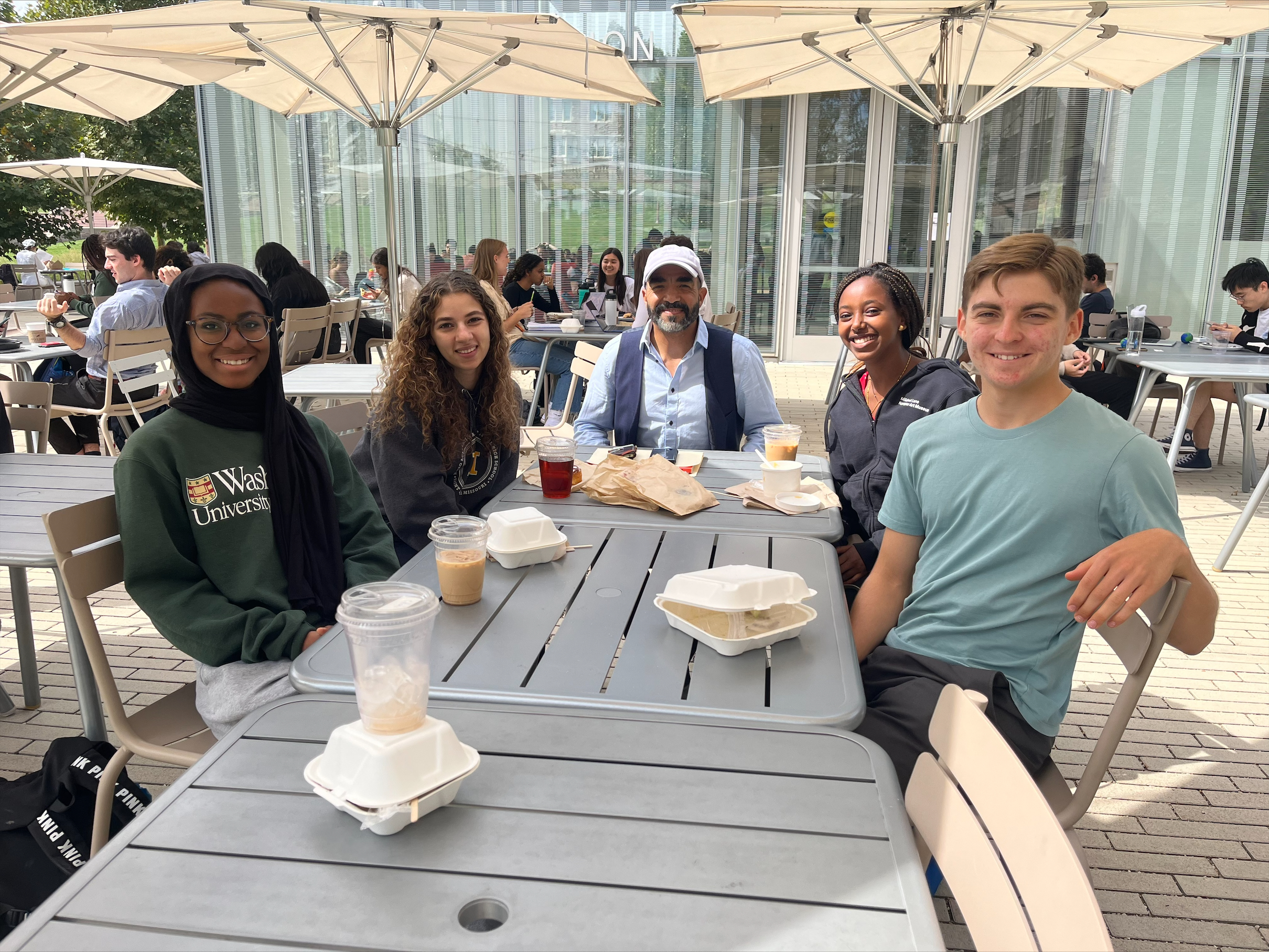A new program in the Department of Jewish, Islamic, and Middle Eastern Studies invites students and professors to engage outside the classroom.
Earlier this semester, Flora Cassen, chair of the Department of Jewish, Islamic, and Middle Eastern Studies (JIMES), emailed students in the department with a novel idea: “Invite your favorite JIMES professor to lunch. On us.” Almost immediately, enthusiastic responses filled her inbox. Seventeen groups of two to three students invited eight different faculty members to lunch. Though she anticipated some interest, Cassen was surprised and delighted by how eager students were to participate.
“We are a cross-disciplinary department that brings together people from so many different backgrounds,” Cassen said. “One of my goals from the beginning has been to build and nurture community between all these different groups, but one of the most important building blocks of a good education is the relationship between faculty and students. So I was really happy when my inbox filled with students who wanted to invite their professors to lunch and am even more delighted to hear that it was a good experience.”
JIMES initiated the “Take Your Favorite Professor to Lunch” program with the goal of enriching student-professor relationships on a genuine, interpersonal level. Younasse Tarbouni, teaching professor of Arabic and winner of the 2021 Excellence in Teaching Award in Arts & Sciences, says that the experience has helped him engage with students. The simple gesture of getting coffee, tea, or lunch has led to benefits both in and out of the classroom.
“It’s more than just ‘hi, how are you.’ It does miracles,” said Tarbouni. “I still have appointments with, I think, eight more students.”
“This is a great initiative because it provides both professors and students with an incentive to get to know each other in a welcoming environment,” said Heiran Andeberhan, a sophomore in Tarbouni's class. “I loved that it was a group lunch because it gave me a chance to form connections with my classmates as well as with my professor.”

Students take the lead, sending the first email to a professor that they would like to take to lunch. The department reimburses students for the meal, and the student and teacher get to focus on the conversation. Topics can include anything from personal stories to Formula 1 racing. Tarbouni says that his students want to talk about all sorts of things, like their career aspirations, favorite movies, and insecurities. They even poke fun at each other’s music tastes.
“While our class is small and functions like a seminar, I thought it was wonderful to be able to meet in a more intimate social setting, to engage in informal conversation, and to get to know one another better. Was it my imagination that subsequent class meetings seemed to have a different quality to them?,” said Hillel Kieval, the Gloria M. Goldstein Professor of Jewish History and Thought.
Tarbouni thinks that the change in scenery evokes a spontaneity that invites genuine, human conversation.
“I didn’t eat during all those meetings, and I noticed that they were not eating either! The food was there but we just spent the whole time talking, then we would take it all to go,” Tarbouni said. “These meetings nurture relationships with students and foster relationships that students can build with each other as well.”
Tarbouni also found that these lunches reinvigorate students’ motivation and sense of belonging in class. He can now tailor each class to his students’ unique educational and personal preferences. “You have students that you think are not into the material at all, and you’d find that you were totally wrong,” he said. “They had so much to contribute, but they needed that little extra step to open things up. Even the students were like, ‘what’s happening? How did I cross this bridge?’ I hope it provides our students with validation, that success in college and beyond is not only attainable but can also be enjoyable.”
Tarbouni found that these conversations helped him balance the high academic expectations the university has for its students with the support that each student needs to reach their objectives. By making these connections, he feels like he is better able to include more students in the classroom, but he also sees a larger lesson in the lunches. Washington University’s campus is filled with people from many different backgrounds who speak a wide range of languages.
“The only way to ensure we are including everybody is to start having more genuine conversations,” he said. “Have coffee with people you’ve never talked to.”



